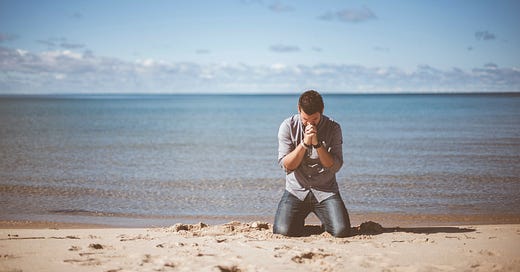
I've never taken issue with those who choose to be atheists. I'm a person of faith, and am grateful for the strength God has given me and my family to deal with the challenges in our lives, but I by no means look down on those who see things differently. Some of the most kind and moral people I know are atheists. They may view religion as a waste of time, and prayer to be a fruitless exercise, but that doesn't make me respect them any less.
What does bother me, however — especially in the wake of a terrible tragedy (like the school shooting in Parkland, Florida last week) — is the inclination of some atheists (and even some believers) to take offense to, and show hostility toward, to those who call for prayers for the victims and their families. The argument seems to be that the expression of prayer somehow distracts from, or offers a false solution to, the situation that led to the tragedy.
Case in point:

For those unfamiliar with Neil deGrasse Tyson, he's an astrophysicist and author who shows up on national television from time to time to weigh in on various scientific topics. And while he's just one man expressing a viewpoint on Twitter, his attitude toward prayer is actually quite representative of a number people.
Whenever there's a horrific event where lives are needlessly lost, this sentiment comes out of the woodwork — especially on social media. Here was actor Wil Wheaton responding to Speaker Paul Ryan's call for prayer after last year's Texas church shooting:


Celebrities, of course, are by no means the only people that think this way. I'm betting that nearly everyone reading this column has seen similar comments (perhaps not as colorful) on their Facebook timelines, left by friends, family, or acquaintances.
So, it seems as though some clarifications may be in order, regarding the purpose of prayer, for those who view the practice — in times like these — as a cop-out:
Prayer is not an assurance that bad things won't happen
Contrary to the irony that people like Tyson and Wheaton believe they've discovered, I've never met a fellow Christian (or any person of faith) who believes that prayer is an impenetrable shield that protects individuals from all forms of harm. It isn't viewed as a guarantee of anything. Prayers are appeals for strength, security, guidance, comfort, healing, and a plethora of other things. They're also expressions of gratitude and service.
Prayer is a conversation with God, not a purchase agreement. Those who view it as the latter are working off of flawed premise, which makes it harder for them to find value or meaning in (or even respect) the practice.
Prayer is not a substitute for action
When people pray for God to alleviate suffering, they're not suggesting that their prayers are solving the problems that led to that suffering. Faith isn't an argument against change. It's not a case for inaction.
So if someone calls for prayers in the wake of a tragedy, and your inclination is to respond with something like "Prayers won't fix this!" or "Prayers aren't enough!", you should know that you're completely misinterpreting that person's words and intentions.
They're asking for strength and healing, not the outsourcing of societal responsibility. Good people can disagree (and often do) on how to best address complex problems like gun violence, but framing prayer as an abdication of that responsibility (or an endorsement of a "doing nothing" approach) isn't fair. I don't know anyone who thinks the debate and strategy should end at prayer. Charges to the contrary serve no purpose other than to further divide us. And this division is counterproductive to making societal progress on these issues.
There are a lot of challenges we face as a nation. Spiritual empathy isn't one of them, even if you think the beliefs of those who express it are hokey or pointless.












